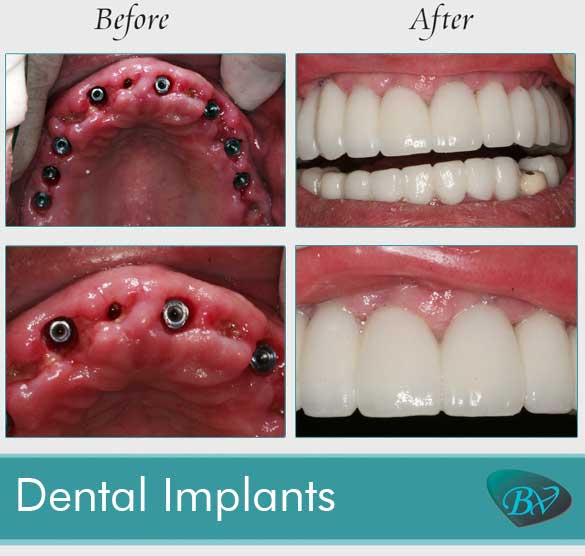Fascination About Dental Sense
Fascination About Dental Sense
Blog Article
The smart Trick of Dental Sense That Nobody is Discussing
Table of ContentsNot known Incorrect Statements About Dental Sense Dental Sense Fundamentals ExplainedExamine This Report on Dental SenseDental Sense Can Be Fun For Anyone
are medical gadgets surgically dental implanted right into the jaw to bring back a person's capability to eat or their appearance. They offer support for fabricated (fake) teeth, such as crowns, bridges, or dentures. When a tooth is lost as a result of injury or illness, an individual can experience issues such as quick bone loss, defective speech, or changes to eating patterns that result in pain.Dental implant systems contain an oral implant body and oral implant joint and may also include an abutment addiction screw. Front tooth filling. The oral implant body is operatively put in the jawbone in place of the tooth's root. The oral implant joint is typically connected to the implant body by the abutment addiction screw and prolongs via gum tissues right into the mouth to sustain the connected fabricated teeth
(https://medium.com/@matthewmusic33101/about)Structure of The Dental Implant System selecting dental implants, talk with your dental provider about the possible benefits and dangers, and whether you are a candidate for the treatment. Things to consider: Your total health and wellness is a vital aspect in identifying whether you are an excellent prospect for oral implants, for how long it will require to recover, and how much time the implant might stay in place.
Smoking may impact the healing process and decrease the long-lasting success of the dental implant. The healing process for the implant body may take a number of months or longer, throughout which time you usually have a short-term abutment instead of the tooth. the dental implant treatment: Very carefully adhere to the dental health directions provided to you by your oral copyright.
Little Known Questions About Dental Sense.
Implant failure can cause the demand for one more surgery to fix or change the implant system. Brings back the capability to chew Recovers cosmetic look Helps keep the jawbone from diminishing due to bone loss Preserves the health and wellness of the surrounding bone and gums Aids maintain adjacent (close-by) teeth stable Enhances top quality of life Damages to surrounding natural teeth throughout implant placement Injury to the surrounding tissues throughout surgical treatment, such as sinus perforation Injury throughout surgical procedure (for instance, fracture of surrounding jawbone) Poor feature, such as seeming like the teeth do not bite together normally An experience that the tooth is loosened or turning in position arising from an abutment screw loosening up Implant body failure (looseness of the dental implant body) due to systemic infection, which may be more probable in patients with unrestrained diabetics issues as a result of regional infection in bone and gums sustaining the dental implant body because of delayed recovery, which may be extra likely in clients that smoke Trouble cleansing the gum tissues around the dental implant, resulting in bad dental hygiene Neglected gum condition link Post-surgical numbness due to nerve impingement or damage Constantly notify health and wellness care suppliers and imaging professionals that you have oral implants prior to any magnetic resonance imaging (MRI) or x-ray treatments.
FDA is not familiar with any type of adverse events reported for MRI or x-ray procedures with dental implants. Dental implants systems are commonly made of products that follow international agreement criteria of the International Company for Standardization (ISO) or ASTM International. These requirements have information of what makes a secure product.

An oral implant is a structure that replaces a missing out on tooth. With screw-like devices, the surgeon inserts an implant right into the jawbone, and it acts as an anchor for a synthetic tooth, called a crown.
Not known Details About Dental Sense
Some individuals are not eligible for dental implant surgical treatment. It is for dental specialists to operate people with: severe illnessuncontrollable metabolic diseasebone or soft tissue condition or infectionIf these issues are settled, an individual can have the surgery. In, dental doctors abstain from operating people with: If individuals with any one of the above undergo dental implant surgical procedure, there is a greater threat of the dental implant failing.

Oral dental implant surgical procedure is an individualized procedure. Offer you time to heal. Connect the article and last crown, bridge or denture.
Next, your surgeon will very carefully position the dental implant into your jaw. If your implant is near the front of your mouth, your dental expert will make a short-lived tooth for you to wear until you recover.
Dental Sense Fundamentals Explained
During the recovery phase, your jawbone needs to fuse to the oral implant. This procedure can take anywhere from 3 to 9 months.
When your dental implant heals, your dental expert can attach the abutment (little adapter message) and your last repair (crown, bridge or denture). This normally takes about one hour to complete and might require a 2nd minor surgery. You shouldn't feel any kind of discomfort throughout your oral implant treatment due to the fact that your service provider will certainly use drug to numb your gums.
Report this page